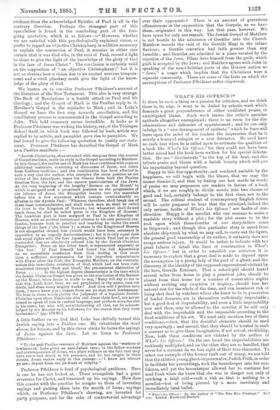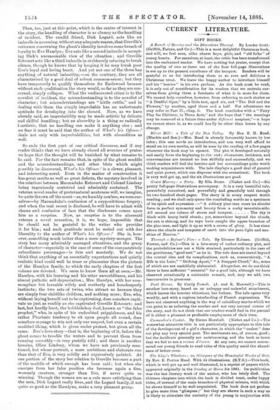WHAT'S HIS OFFENCE ?*
IF there be such a thing as a passion for criticism, and we think there is, its edge is wont to be dulled by artistic work which demands a great preponderance of either undiluted praise, or unmitigated blame. Such work leaves the critic's peculiar aptitude altogether unemployed; there is no room for the dis- criminations and delicacies of appraisement ; and he can only indulge in a nice derangement of epithets," which he fears will leave upon the mind of his readers the impression that he is merely a honeyed eulogist or a sour detractor. He need have no such fear when he is called upon to estimate the qualities of a book like What's his Offence ? for they could not have been better mixed had the book been written for his special delecta- tion. He can " discriminate " to the top of his bent, and dis- tribute praise and blame with a lavish bounty which will put his impartiality beyond question.
Happy in this fine opportunity, and rendered amiable by the happiness, we will begin with the blame, that we may the sooner dismiss it, and that by letting our last words be words of praise we may prepossess our readers in favour of a book which, if we are roughly to divide novels into two classes of good and bad, certainly belongs to the first class, not to the second. The critical student of contemporary English fiction will be quite prepared to hear that the principal, indeed the only serious, faults of What's his Offence ? are faults of con- struction. Happy is the novelist who can manage to make a readable story without a plot ; for the plot seems to be the rock upon which three-fourths of our story-tellers come to thipwreck ; and though this particular story is saved from absolute shipwreck by what we may call, to carry out the figure, the general good seamanship of its author, it certainly does not escape serious injury. It would be unfair to indicate with too great fulness of detail the lines of construction in 1Vhat's his Offence ? but in order to establish our criticism it is necessary to explain that a great deal is made to depend upon the assumption by a young lady of the part of a ghost, and the discovery of the identity of the supposed supernatural visitant by the hero, Greville Estcourt. That a school-girl should travel several miles from home to play a practical joke, should be absent from that home for a number of consecutive nights without exciting any suspicion or inquiry, should lose her natural rest for the whole of the time, and run imminent risk of being shot dead by watchers whom she knew to be in possession of loaded firearms, are in themselves sufficiently improbable ; but a good deal of improbability, and even a little impossibility now and then, may be allowed to the novelist if he will only deal with the improbable and the impossible according to the fixed conditions of his art. We need only mention two of these conditions,—first, that the doubtful elements should be used very sparingly ; and second, that they should be treated in each a manner as to give them imaginative, if not actual, credibility. Now, both these conditions are violated by the author of What's his Offence? On the one hand the improbabilities are recklessly multiplied, and on the other they are so handled, that never for a moment do we lose sight of their true character. To select one example of the former fault out of many, we are told that the skittish young ghost-impersonator, Judith Frith, in order to facilitate her proceedings, took the housekeeper into her con- fidence, and yet the housekeeper allowed her to continue her mad freak when she knew that she was in danger not only of catching a fatal cold—such a risk as that is nothing to a novelist—but of being pierced by a more inevitably and immediately fatal bullet.
• What's his Offence ? By the Author of "The Two Miss Flemings." In 3 vols. London : Hurst and Blacken. • Then, too, just at this point, which is the centre of interest in the story, the handling of character is as clumsy as the handling of incident. The candid friend, Dick Legard, acts like an imbecile in assuming, without any adequate reason, that Greville's reticence concerning the ghost's identity involves some breach of loyalty to Eve Hamlyn ; Eve acts like a second imbecile in accept- ing Dick's unreasonable view of the situation; and Greville Estcourt acts like a third imbecile in stubbornly refusing to break silence, though he knows that by keeping it he may break poor Eve's loyal and loving heart. And yet not one of the three has anything of natural imbecility,—on the contrary, they are all characterised by a good deal of robust common-sense; but they have temporarily to qualify themselves for Earlswood because without such qualification the story would, so far as they are con- cerned, simply collapse. What the undiscovered crime is to the novelist of incident, the misunderstanding is to the novelist of character ; but misunderstandings are " kittle cattle," and in dealing with them the simply improbable has an unfortunate aptitude for developing into the absurd. Now, as we have already said, an improbability may be made artistic by delicate and skilful handling ; but an absurdity is a thing so radically i aartistic, that no handling can make it anything else ; and we fear it must be said that the author of What's his Offence ? deals not only with improbabilities, but with absurdities as well.
So ends the first part of our critical discourse, and if any reader thinks that we have already closed all avenues of praise, we hope that the thought will be banished by what remains to be said. For the fact remains that, in spite of the ghost muddle and the misunderstandings, and other blots which might p meibly be discovered, What's his Offence? is a clever, pleasant, and interesting novel. Even in the matter of construction it has great merits as well as great defects, the mystery involved in the relations between Marmaduke Estcourt and Colonel Lindsay being ingeniously contrived and admirably sustained. The veteran novel-reader of preternatural acuteness will, we imagine, be quite thrown off the scent—as, we humbly confess, we were our- selves—by Marmaduke's confession of a supposititious forgery; and when the real secret is disclosed, he will have to admit with shame and confusion of face that the disclosure comes upon him as a surprise. Now, as surprise is to the aforesaid veteran a novel sensation, it is, we hope, impossible that he should not be grateful to the writer who provides it for him ; and such gratitude must be meted out with due liberality to the author of What's Ms Offence ? She is, how- ever, something much better than a mere mystery-monger. The story has many admirably managed situations, and the grasp of character—especially in the case of some of the comparatively subordinate personages—is firm and masterly. We do not think that anything of an essentially unpretentious and quietly realistic kind could well be truer or pleasanter than the picture of the Hamlyn family, to which the early chapters of the first volume are devoted. We seem to know them all at once,—Mr. Hamlyn, with his learning and his titter unworldliness, and his almost pathetic self-depreciation ; Mrs. Hamlyn, with her com- monplace but loveable wifely and motherly and honskeeperly instincts ; the two sets of twins, who attract us because they are simply four childlike children, and nothing more ; Eve, who, without laying herself out to be captivating, does somehow capti- vate us just as readily as she captivated Greville Estcourt; and last, but hardly least, the hobbledehoy Joel, known as "the false prophet," who, in spite of his undoubted priggishness, and his rather Pharisaic tendency to sit upon people all round, does somehow manage to win not only our respect, but even a certain modified liking, which is given under protest, but given all the same. Eve's love-story—that is, the beginning of it, before the ghost comes to trouble the waters and to prevent them from running smoothly—is very prettily told ; and there is another heroine, Olive Lindsay, whom we have not previously men- tioned, but whose portrait, a more ambitious and elaborate one than that of Eve, is very solidly and expressively painted. At one portion of the story her relation to Greville becomes a part of the muddle of which enough has been said ; but when she emerges from her false position she becomes again a fine, womanly creature, stronger than Eve, if never quite so winning. Though the women are as a rule more satisfying than the men, Dick Legard really lives, and the Legard family, if not quite so good as the Hamlyns, make a very pleasant group.







































 Previous page
Previous page